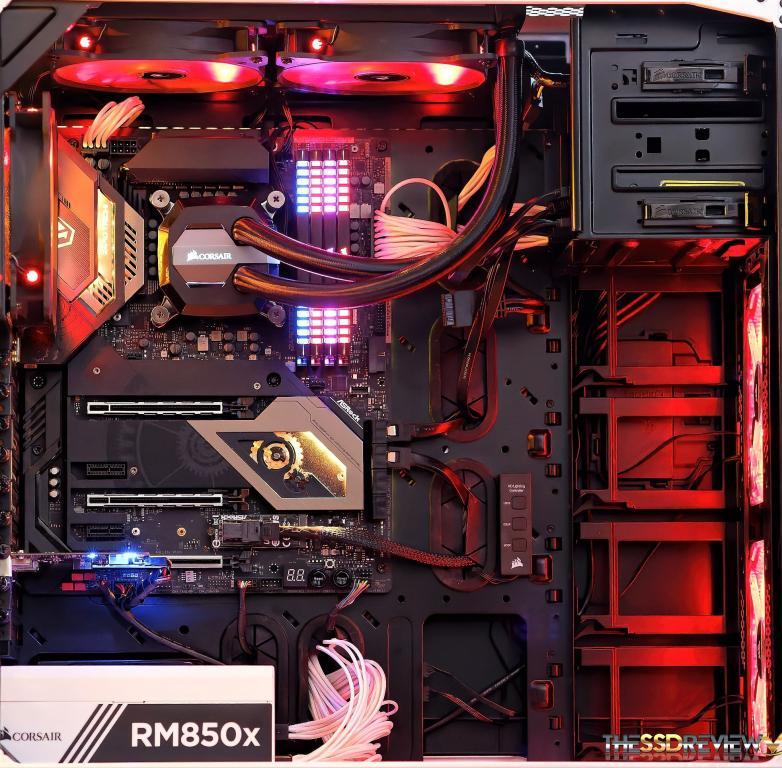TSSDR TEST BENCH AND PROTOCOL
SSD testing at TSSDR differs slightly, depending on whether we are looking at consumer or enterprise storage media. For our Samsung 870 EVO SATA 3 SSD testing today, our goal is to test in a system that has been optimized with our SSD Optimization Guide. To see the best performance possible, the CPU C states have been disabled, C1E support has been disabled, and Enhanced Intel SpeedStep Technology (EIST) has been disabled.
SYSTEM COMPONENTS
The components of this Test Bench are detailed below. All hardware is linked for purchase and product sales may be reached by a simple click on the individual item. As well, the title is linked back to the individual build article where performance testing can be validated.
TSSDR ASROCK Z490 TAICHI TEST BENCH
| PC CHASSIS: | Corsair Graphite 760T Arctic White Window Chassis |
| MOTHERBOARD: | ASRock Z490 Taichi |
| CPU: | Intel 11th Gen i5-10600K |
| CPU COOLER: | Corsair Hydro Series H110i GTX |
| POWER SUPPLY: | Corsair RM850x 80Plus |
| GRAPHICS: | MSI Radeon RX570 |
| MEMORY: | Corsair Vengeance RGB 32GB DDR4 3600Mhz C18 |
| STORAGE: | Samsung 870 EVO 4TB SATA3 SSD |
| KEYBOARD: | Corsair Strafe RGB Silent Gaming |
| MOUSE: | Corsair M65 Pro Gaming |
| OS | Microsoft Windows 10 Pro 64 Bit |
BENCHMARK SOFTWARE
Let’s start by saying that both the 1TB and 4TB versions of the EVO 870 have the same specs so we will not be posting twice for all benchmarks.
The software in use for today’s analysis is typical of many of our reviews and consists of Crystal Disk Info, ATTO Disk Benchmark, Crystal Disk Mark, AS SSD, Anvil’s Storage Utilities, AJA, and TxBench. Our selection of software allows each to build on the last and to provide validation to results already obtained.
Crystal Disk Info is a great tool for displaying the characteristics and health of storage devices. It displays everything from temperatures, the number of hours the device has been powered, and even to the extent of informing you of the firmware of the device.
Crystal Disk Info validates that our SSD is running in SATA 3 (6Gbps), and also that its features include SMART, NCQ, TRIM and DevSleep.
ATTO Disk Benchmark is perhaps one of the oldest benchmarks going and is definitely the main staple for manufacturer performance specifications. ATTO uses RAW or compressible data and, for our benchmarks, we use a set length of 256mb and test both the read and write performance of various transfer sizes ranging from 0.5 to 8192kb. Manufacturers prefer this method of testing as it deals with raw (compressible) data rather than random (includes incompressible data) which, although more realistic, results in lower performance results.
1TB CAPACITY
4TB CAPACITY
Listed specifications for the Samsung 870 EVO are 560MB/s read and 530MB/s write. These results are a bit under spec, but just as importantly, there is a very steady speed progression with data size increase. This is typical of the making of a solid SSD.
 The SSD Review The Worlds Dedicated SSD Education and Review Resource |
The SSD Review The Worlds Dedicated SSD Education and Review Resource | 


These SATA SSDs are just way too small. I wish the would be available in 16TB memory size. At a unit price of 400,-€. Then I would buy two pieces and then I could finally copy my backups again from the dozens of 100GB M-DISC to two SSDs. One for the data and one for mirroring the data. not only my Mac mini would be happy about it… 😉
Yes I agree; they could easily make them available in 16TB. I also understand though that they consider sales in their manufacture and would believe the interest just isn’t there to mass produce at that, or even the 8TB capacity. Thanks for jumping in!
Should be entered ting a raid configuration test…. can you??